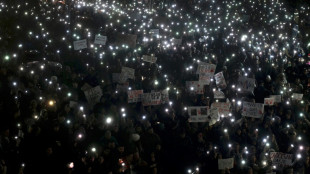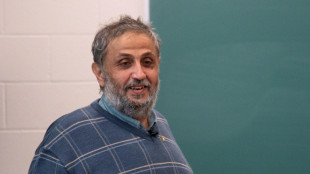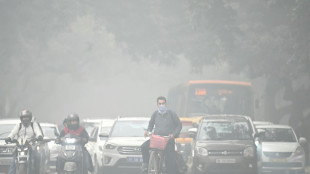
-
 Sweeping Vietnam internet law comes into force
Sweeping Vietnam internet law comes into force
-
Thousands attend Christmas charity dinner in Buenos Aires

-
 Demand for Japanese content booms post 'Shogun'
Demand for Japanese content booms post 'Shogun'
-
Mystery drones won't interfere with Santa's work: US tracker

-
 Global stocks mostly higher in thin pre-Christmas trade
Global stocks mostly higher in thin pre-Christmas trade
-
NASA probe makes closest ever pass by the Sun

-
 Global stocks mostly rise in thin pre-Christmas trade
Global stocks mostly rise in thin pre-Christmas trade
-
Global stocks mostly rise after US tech rally

-
 Investors swoop in to save German flying taxi startup
Investors swoop in to save German flying taxi startup
-
Saving the mysterious African manatee at Cameroon hotspot

-
 The tsunami detection buoys safeguarding lives in Thailand
The tsunami detection buoys safeguarding lives in Thailand
-
Asian stocks mostly up after US tech rally

-
 US panel could not reach consensus on US-Japan steel deal: Nippon
US panel could not reach consensus on US-Japan steel deal: Nippon
-
The real-life violence that inspired South Korea's 'Squid Game'

-
 El Salvador Congress votes to end ban on metal mining
El Salvador Congress votes to end ban on metal mining
-
Five things to know about Panama Canal, in Trump's sights

-
 Mixed day for global stocks as market hopes for 'Santa Claus rally'
Mixed day for global stocks as market hopes for 'Santa Claus rally'
-
Trump's TikTok love raises stakes in battle over app's fate

-
 European, US markets wobble awaiting Santa rally
European, US markets wobble awaiting Santa rally
-
NASA solar probe to make its closest ever pass of Sun

-
 Volkswagen boss hails cost-cutting deal but shares fall
Volkswagen boss hails cost-cutting deal but shares fall
-
Sweden says China blocked prosecutors' probe of ship linked to cut cables

-
 UK economy stagnant in third quarter in fresh setback
UK economy stagnant in third quarter in fresh setback
-
Global stock markets edge higher as US inflation eases rate fears

-
 US probes China chip industry on 'anticompetitive' concerns
US probes China chip industry on 'anticompetitive' concerns
-
Mobile cinema brings Tunisians big screen experience

-
 Honda and Nissan to launch merger talks
Honda and Nissan to launch merger talks
-
Asian markets track Wall St rally as US inflation eases rate fears

-
 Honda and Nissan expected to begin merger talks
Honda and Nissan expected to begin merger talks
-
Asian markets track Wall St rally as US inflation eases rate worries

-
 Trump vows to 'stop transgender lunacy' as a top priority
Trump vows to 'stop transgender lunacy' as a top priority
-
Beyond Work Unveils Next-Generation Memory-Augmented AI Agent (MATRIX) for Enterprise Document Intelligence

-
 Sweet smell of success for niche perfumes
Sweet smell of success for niche perfumes
-
'Finally, we made it!': Ho Chi Minh City celebrates first metro

-
 Tunisia women herb harvesters struggle with drought and heat
Tunisia women herb harvesters struggle with drought and heat
-
Trump threatens to take back control of Panama Canal

-
 Secretive game developer codes hit 'Balatro' in Canadian prairie province
Secretive game developer codes hit 'Balatro' in Canadian prairie province
-
Stellantis backtracks on plan to lay off 1,100 at US Jeep plant

-
 Banned Russian skater Valieva stars at Moscow ice gala
Banned Russian skater Valieva stars at Moscow ice gala
-
Biden signs funding bill to avert government shutdown

-
 Sorrow and fury in German town after Christmas market attack
Sorrow and fury in German town after Christmas market attack
-
France's most powerful nuclear reactor finally comes on stream

-
 Sierra Leone student tackles toxic air pollution
Sierra Leone student tackles toxic air pollution
-
Amazon says US strike caused 'no disruptions'

-
 Qualcomm scores key win in licensing dispute with Arm
Qualcomm scores key win in licensing dispute with Arm
-
Scientists observe 'negative time' in quantum experiments

-
 US approves first drug treatment for sleep apnea
US approves first drug treatment for sleep apnea
-
Amazon expects no disruptions as US strike goes into 2nd day

-
 US confirms billions in chips funds to Samsung, Texas Instruments
US confirms billions in chips funds to Samsung, Texas Instruments
-
Wall Street rebounds despite US inflation ticking higher


Brain drain: Zimbabwe fears losing teachers to the UK
After an exodus of nurses, Zimbabwe now faces losing its teachers as a new British recruitment policy threatens a fresh brain drain in the southern African country confronting a devastated economy.
A British government update posted earlier this month listed teachers who qualified in Zimbabwe as eligible to apply directly for "qualified status" -- allowing succesful candidates to go straight into classrooms without further training.
The new policy, which the British government says will boost "opportunities for highly qualified teachers wherever they trained", will begin in February 2023 and also applies to teachers who qualified in Ghana, Nigeria and South Africa.
For decades Zimbabwe's education system was respected as one of the best on the continent -- one of the few accomplishments of former president Robert Mugabe's regime.
Years of unstinting economic decline blamed mainly on misgovernance have taken off the shine but the country still retains a pool of highly educated and skilled teachers.
Yet, like most public workers, they earn meagre salaries. Some have already moved to other countries including South Africa and Rwanda.
"This is great news," said Nyasha, a teacher who asked to be identified only by her first name. "The conditions here are unbearable".
In Zimbabwe teachers can make up to 50,000 Zimbabwean dollars ($75) a month, a tiny fraction of what they can hope to earn in Britain, Zimbabwe's former colonial ruler.
Qualified teachers in England, where the cost of living is significantly higher, are paid at least £2,300 ($2,800) per month according to the Department for Education.
But an analysis by Schools Week, an outlet covering the sector, suggested just 73 percent of a key recruiting target for new teachers in English secondary schools would be met this year.
Some in Zimbabwe have warned that the prospect of its teachers relocating to the UK threatened to tip over an already wobbly schooling system.
- 'What will happen?' -
"Where does that leave us as a country?" asked Obert Masaraure, the head of a rural teachers' union.
Zimbabwe, with a population of 15 million people of which 41 percent are under the age of 14, has about 150,000 teachers for more than 10,000 schools.
The government says that it is at least 25,000 short of the number required.
"If we all leave, what will happen to our own children?" asked Tafadzwa Munodawafa, who leads another educators' union fighting for better pay.
The education ministry refused to comment saying the government was unaware of the United Kingdom's recruiting policy.
To try to stem an outflow of doctors and nurses, who have moved aboard en masse in recent years, authorities have made it more difficult to obtain the necessary paperwork to prove their qualifications.
But some say this misses the point.
"Government should do the right thing and prioritise paying our professionals well so that we can stem the brain drain," Dr Henry Madzorera, a former health minister and opposition official, told AFP.
The latest statistics from Zimbabwe's health watchdog show that over 4,000 healthcare workers resigned from public institutions in the year to November -- with many thought to have emigrated.
A.Leibowitz--CPN




